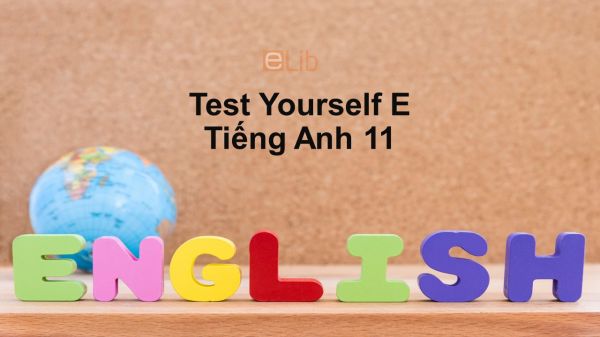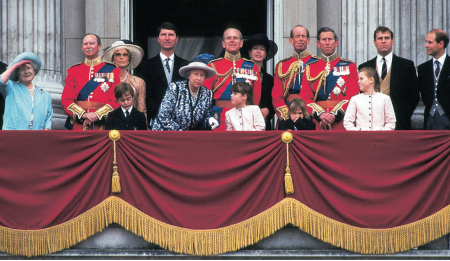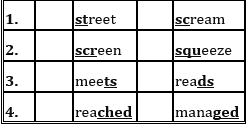Unit 12-14 lớp 11: Test Yourself E
Bài học Test Yourself E lớp 11 này giúp các em ôn tập từ vựng và một số điểm ngữ pháp quan trọng từ bài 12 đến bài 14 thông qua các bài tập ở các kỹ năng: Listening, Reading, Pronunciation and Grammar & Writing.
Mục lục nội dung

1. Listening Test Yourself E Unit 12-14 lớp 11
Listen and complete the sentences (Lắng nghe và hoàn thành câu)
1. Television brings _______ from around the world into millions of homes.
2. A person sitting in his house can ________ make a speech or visit a foreign country.
3. Home viewers can see and learn about ______ in far-away lands.
4. Entertainment programmes consist of ________ .
5. People find it more convenient as well as cheaper to sit comfortably at home ________ .
Guide to answer
1. Television brings pictures and sounds from around the world into millions of homes.
(Truyền hình mang hình ảnh và âm thanh từ khắp nơi trên thế giới vào hàng triệu ngôi nhà.)
2. A person sitting in his house can watch the president make a speech or visit a foreign country.
(Một người ngồi trong nhà của mình có thể xem tổng thống phát biểu hoặc thăm nước ngoài.)
3. Home viewers can see and learn about about people, places, and things in far-away lands.
(Người xem ở nhà có thể xem và tìm hiểu về con người, địa điểm và mọi thứ ở những vùng đất xa xôi.)
4. Entertainment programmes consist of plays or dramas, light comedies, sporting events, and motion pictures.
(Các chương trình giải trí bao gồm vở kịch hoặc kịch, phim hài nhẹ nhàng, sự kiện thể thao và hình ảnh chuyển động.)
5. People find it more convenient as well as cheaper to sit comfortably at home than to go out.
(Mọi người cảm thấy thuận tiện hơn cũng như rẻ hơn khi ngồi thoải mái ở nhà hơn là đi ra ngoài.)
Tapescript
Television is one of man's most important means of communication. It brings pictures and sounds from around the world into millions of homes. A person with a television set can sit in his house, and he can watch the president make a speech or visit a foreign country. He can see a war happen and watch statesmen try to bring about peace. Through television, home viewers can see and learn about people, places, and things in far away lands. Television also provides more entertainment programs than any other kinds. The programs include plays or dramas, light comedies, sporting events, and motion pictures. So television now plays an important role in many people's lives. It is more convenient as well as cheaper for people to sit comfortably at home than go out.
Tạm dịch
Truyền hình là một trong những phương tiện giao tiếp quan trọng nhất của con người. Nó mang hình ảnh và âm thanh từ khắp nơi trên thế giới vào hàng triệu ngôi nhà. Một người có tivi có thể ngồi trong nhà của mình, và anh ta có thể xem tổng thống phát biểu hoặc thăm nước ngoài. Anh ta có thể thấy một cuộc chiến xảy ra và xem các chính khách cố gắng mang lại hòa bình. Thông qua truyền hình, người xem ở nhà có thể xem và tìm hiểu về con người, địa điểm và mọi thứ ở vùng đất xa xôi. Truyền hình cũng cung cấp nhiều chương trình giải trí hơn bất kỳ loại nào khác. Các chương trình bao gồm vở kịch hoặc phim truyền hình, hài kịch nhẹ nhàng, sự kiện thể thao và hình ảnh chuyển động. Vì vậy, truyền hình bây giờ đóng một vai trò quan trọng trong cuộc sống của nhiều người. Nó thuận tiện hơn cũng như rẻ hơn cho mọi người ngồi thoải mái ở nhà hơn đi ra ngoài.
2. Reading Test Yourself E Unit 12-14 lớp 11
Read the passage and decide whether the statements are true (T) or false (F)
(Đọc kĩ đoạn văn và quyết định việc các báo cáo là đúng (T) hoặc sai (F))

Linda lives alone in London, with her wonderful collection. She has been collecting all the royal mementoes since 1960 when she saw the wedding of Princess Margaret on TV. The first things she bought were a disk with the Queen’s head in the centre, and a few Coronation mugs to go with it. And now she has a huge range of things: pictures, paintings, ashtrays, hundreds of mugs, tea-pots, tea-cloths, biscuit tins, posters, books, flags, toast racks, egg cups, candle sticks and so on. In fact, she has over four thousand Royal souvenirs. It takes all her spare time to keep everything clean and dusted. She is often playing around, making a special area for one of the Royals. It keeps her amused for hours, and the visitors who come, mainly foreign visitors, never get tired of talking about her Royal family. It is not always easy for Linda to collect the things she really wants. Once she was in a shop and the shop keeper was drinking his tea from a lovely Coronation mug. She offered to buy it from him but he was not interested. So she went out to a shop nearby and bought a very expensive mug and exchanged it for his Coronation mug. She just wanted to put the mug in its proper home.
T F
.png)
.png) 1. Linda has been collecting the royal mementoes since 1960. (Linda đã thu thập các vật lưu niệm của hoàng gia từ năm 1960.)
1. Linda has been collecting the royal mementoes since 1960. (Linda đã thu thập các vật lưu niệm của hoàng gia từ năm 1960.)
.png)
.png) 2. The first things she bought were some Coronation mugs and the Queen's disk. (Những thứ đầu tiên cô mua là một vài chiếc cốc Coronation và đĩa của nữ hoàng.)
2. The first things she bought were some Coronation mugs and the Queen's disk. (Những thứ đầu tiên cô mua là một vài chiếc cốc Coronation và đĩa của nữ hoàng.)
.png)
.png) 3. She has collected over 4.000 Royal souvenirs. (Cô đã thu thập hơn 4.000 món quà lưu niệm của Hoàng gia.)
3. She has collected over 4.000 Royal souvenirs. (Cô đã thu thập hơn 4.000 món quà lưu niệm của Hoàng gia.)
.png)
.png) 4. Foreign visitors never aet bored with talking about her Royal family. (Du khách nước ngoài không bao giờ chán với việc nói về gia đình hoàng gia của cô ấy.)
4. Foreign visitors never aet bored with talking about her Royal family. (Du khách nước ngoài không bao giờ chán với việc nói về gia đình hoàng gia của cô ấy.)
.png)
.png) 5. She bought the Coronation mug from the shop keeper and put it in its proper home. (Cô đã mua cốc Coronation từ người quản lý cửa hàng và đặt nó trong ngôi nhà thích hợp của nó.)
5. She bought the Coronation mug from the shop keeper and put it in its proper home. (Cô đã mua cốc Coronation từ người quản lý cửa hàng và đặt nó trong ngôi nhà thích hợp của nó.)
Guide to answer
1. T 2. F 3. T 4. T 5. F
Tạm dịch
Linda sống một mình ở Luân Đôn. với bộ sưu tập tuyệt vời của cô. Cô đã sưu tập tất cả các kỉ vật hoàng gia kể từ năm 1960 khi cô xem đám cưới của công chúa Margaret trên ti vi. Những vật đầu tiên cô mua là một đĩa với hình đầu nữ hoàng ở giữa và một cái cốc Coronation kèm theo. Và bây giờ, cô có một khối lượng khổng lồ các vật: hình ảnh, tranh vẽ, gạt tàn thuốc, hàng trăm cốc, bình trà, khăn trà, hộp bánh quy, áp phích, sách, cờ, kệ bánh mì nướng, cốc ăn trứng, giá nến. ... Trong thực tế, cô đã có hơn bốn nghìn đồ kỉ niệm hoàng gia. Cô dành tất cả thời gian rảnh rỗi của mình để giữ cho chúng sạch sẽ không bị bụi. Cô thường đi chơi xung quanh, tạo nên một khu vực đặc biệt cho hoàng gia. Nó làm cô thích thú trong nhiều giờ, và các khách tham quan, chủ yếu là du khách nước ngoài không bao giờ cảm thấy chán nói về gia đình hoàng gia của cô. Thật không hề dễ dàng khi thu thập những vật cô muốn. Một lần có đang ở trong một cửa hàng và người bán hàng đang uống trà bằng một cái cốc Coronation đáng yêu cô đã đề nghị mua nó nhưng ông không quan tâm. Vì vậy, cô đã đi đến một cửa hàng gần đó và mua một cốc rất đắt và đổi lấy cái cốc Coronation của ông ta. Cô chỉ muốn đặt cái cốc ở chỗ thích hợp với nó...
3. Pronunciation and Grammar Test Yourself E Unit 12-14 lớp 11
a. Listen and put a tick (✓) in the right box, paying attention to the pronunciation of the underlined part of the word
(Lắng nghe và đánh dấu (✓) vào ô đúng, chú ý đến cách phát âm của phần gạch dưới của từ này)
b. Complete the following sentences with that or who. If it is possible to write "that" or leave it out, write "that" in brackets
(Hoàn thành câu với that hoặc who. Nếu trong trường hợp có thể lược bỏ "that", hãy viết "that" trong ngoặc)
Example
Why do you always disagree with everything (that) I say?
1. Kate is the only person _____ understands me.
2. Why do you blame me for everything _____ goes wrong?
3. Are these the books _____ you are looking for?
4. It was Judy _____ taught us English.
5. The student _____ won the shcolarship is going to study in Britain.
6. The dress _____ Mary boucht yesterday doen't fit her very well.
Gudie to answer
1. Kate is the only person who understands me.
(Kate là người duy nhất hiểu tôi.)
2. Why do you blame me for everything that goes wrong?
(Tại sao bạn đổ lỗi cho tôi cho tất cả mọi thứ sai lầm cho tôi?)
3. Are these the books (that) you are looking for?
(Đây có phải là những cuốn sách mà bạn đang tìm kiếm không?)
4. It was Judy who taught us English.
(Chính là Judy đã dạy chúng tôi tiếng Anh.)
5. The student who won the shcolarship is going to study in Britain.
(Học sinh giành được học bổng sẽ học ở Anh.)
6. The dress (that ) Mary bought yesterday doen't fit her very well.
(Chiếc váy Mary đã mua hôm qua không hợp với cô ấy lắm.)
4. Writing Test Yourself E Unit 12-14 lớp 11
Write a paragraph of 120 words about one of your hobbies, following these guidelines
(Viết một đoạn văn khoảng 120 từ về một trong những sở thích của bạn, làm theo các hướng dẫn)
- What your hobby is
- When you started it
- How you enjoy it
- How much time you spend on it
- Why you enjoy it
- How long you think you continue with your hobby
Tạm dịch
- Sở thích của bạn là gì
- Bạn bắt đầu thích nó khi nào
- Bạn thích nó như thế nào
- Bạn dành bao nhiêu thời gian vào nó
- Tại sao bạn thích nó
- Bạn nghĩ bạn sẽ tiếp tục sở thích của bạn trong bao lâu
Gudie to answer
My hobby is listening to music. In my free time, I listen any kinds of music that I find interesting. And I am a big fan of K-pop. I started listening when I was 12. Sometimes, I listen English news. It helps me raise my knowledge and improve my listening skills. I usually listen in my free time, especially after a long working day. Through listening, I can concentrate to do something better. Music helps me relax and creat a good mood to have more energy to start a new day. Music would be my lifelong friends. I would never stop listening them in my life.
Tạm dịch
Sở thích của tôi là nghe nhạc. Trong thời gian rảnh rỗi, tôi nghe bất kỳ loại nhạc nào mà tôi thấy thú vị. Và tôi là người cuồng nhạc K-pop. Tôi bắt đầu nghe khi tôi năm 12 tuổi. Thỉnh thoảng, tôi có nghe bản tin Tiếng Anh. Nó giúp tôi mở mang kiến thức và cải thiện kĩ năng nghe của mình. Tôi thường nghe nhạc vào thời gian rảnh rỗi, đặc biệt là sau một ngày dài làm việc vất vả. Thông qua việc nghe, tôi có thể tập trung làm một điều gì đó tốt hơn. Âm nhạc giúp tôi thư giãn và đem đến một tâm trạng tốt để có nhiều năng lượng hơn bắt đầu một ngày mới. Âm nhạc sẽ luôn là người bạn suốt đời của tôi. Tôi sẽ không ngừng nghe nhạc trong cuộc đời mình.
5. Practice Task 1
Complete the sentences with both ... (and); neither ... (nor) or either ... (or) (Hoàn thành câu với "both ... (and)", "neither ... (nor)" hoặc "either ... (or)")
1. I tried twice to phone George, but ______ times he was out.
2. Do you want tea or coffee? - ______. I really don't mind.
3. I was invited to two parties last week, but I couldn't go to ______ of them.
4. Where is Liz? Is she at work or at home? - ______. She's away on holiday.
5. To get to the town center, you can go along the footpath by the river or you can go along the road. You can go ______ way.
6. I saw an accident this morning. One car drove into the back of another. Fortunately, ______ driver was injured, but ______ cars were badly damaged.
7. I can meet you next Monday or: Friday. Would ______ of those days be convenient for you?
8. John and I couldn't get into the house because ______ of us had a key.
9. When shall I phone, in the morning or afternoon? - ______. I'll be in all day.
10. Sarah and I play tennis together regularly, but ______ of us can play well.
6. Practice Task 2
Read the passage, then choose the correct answer (Đọc bài văn, sau đó chọn câu trả lời đúng)
In the 20th century, magazines have been a major growth area of popular publishing. Specialist magazines cater to every imaginable field and activity. In the United Kingdom, over 12,000 periodicals, magazines, bulletins, annuals, trade journals, and academic journals are published on a regular basis. There are some 40 women's magazines and over 60 dealing with particular sports, games, hobbies, and pastimes. Although some US magazines, such as The Saturday Evening Post, has succumbed to competition of television, many continue "to have enormous international circulations, The Reader's Digest over 16 million, The National Geographic over 10 million. For many people, magazines have been the most available and widely used form of continuing education, providing information about history, geography, literature, science, and the arts, as well as guidance on gardening, cooking, home decorating, financial management, psychology, even marriage and family life.
Until the rise of television, magazines were the most available form of cheap, convenient entertainment in the English-speaking world. Radio served a similar function, but it was more limited in what it could do. Magazines and television, however, both address the more powerful visual sense. During the third quarter of the 20th century, coincident with a dramatic rise in the popularity of television, many general-interest, especially illustrated magazines went out of business. The shift in attention of a mass, audience from reading such magazines to watching television has been a major factor in this decline, but it is an implicit tribute from television to the older genre that its programs are generally organized in a single format and content.
1. From the passage, it can be inferred that ______.
a. movies have replaced magazines
b. the author is fond of magazines
c. almost all magazines are printed in English
d. home decorating magazine are dramatic
2. According to the passage, which of the following magazines is no longer printed?
a. The Saturday Evening Post
b. The Reader's Digest
c. The Nation
d. The National Geographic
3. The passage implies that magazines ______.
a. are less visual than radio
b. put television out of business
c. influence television programs
d. have a limited range of subjects
4. The passage mainly discusses ______.
a. the rise and fall of the radio business
b. the growth and decline of magazines in the 20 century
c. magazines and continuing education
d. the decline of international circulation
5. What does the author say about mass audiences?
a. They have little influence on communications in the 20th century.
b. They have gone out of business.
c. They get information about gardening and psychology from radio.
d. They have shifted their attention from magazines to television.
7. Conclusion
Qua bài học này các em cần củng cố từ vựng và ngữ pháp đã học qua các bài học từ Unit 12-14 theo các kĩ năng Listening, Reading, Pronunciation and Grammar and và Writing. Thông qua những bài tập này các em sẽ có cơ hội ghi nhớ thêm kiến thức mà mình đã học.
Tham khảo thêm

